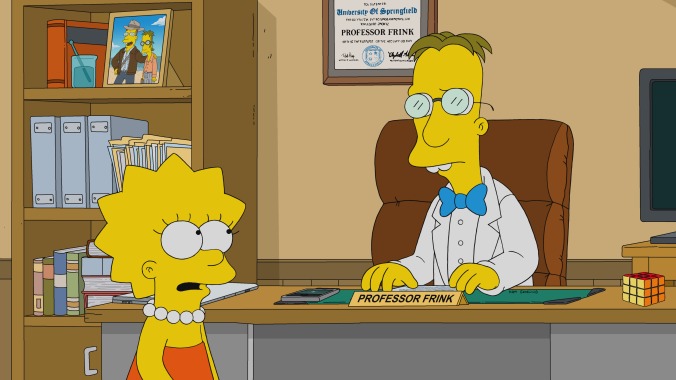Frink coins a cryptocurrency, but a heartfelt Simpsons mints an unexpectedly satisfying story


“A girl learns a lot writing a second grade report.”
As premises go, “Frinkcoin” had me rolling my eyes. Not to stereotype a writers room partly packed with aging lifers who’ve increasingly come off like reactionary cranks whenever a new idea heaves into view, but seeing “The Simpsons” and “cryptocurrency” in the synopsis of tonight’s episode had the ring of a dart-throw at a plot-board of second-tier index card ideas. And, sure, the actual, decidedly complex alternative currency concept upon which the episode is based is dispensed with in a suspiciously Wikipedia-sounding info dump from guest TV nerd Jim Parsons. (Who, yes, does use the groan-worthy neologism “kachinga.”) But at least Kevin Michael Richardson gets to do a funny bit singing the new, inscrutable Schoolhouse Rock-style jingle for the stunningly successful new cryptocurrency that’s made Professor John Frink even richer than Monty Burns, and the cursory role Frinkcoin plays in the episode is tossed aside in a far-too-extensive-to-read flash of a disclaimer card.
(Here’s the part where I add my own disclaimer that I neither know nor especially care about cryptocurrencies and helpfully note that, as with the last time I wrote about the issue in passing, all no-doubt well-intentioned primers on the subject sent to my email will go, sadly, unread.)
The death-knell for a Simpsons issue episode is when the issue trumps the story and the characters, and, thankfully, “Frinkcoin” (credited to human Simpsons season bright spot Rob LaZebnik) simply uses the cryptocurrency concept as an excuse for a largely successful exercise in side-character development. Lisa gets her time to shine, too—her vegetarianism isn’t treated as a joke for a change, as Marge and Homer’s outing to Springfield’s newest vegan restaurant is shown as a ploy to get Lisa to write her “most interesting person” school paper about her. (Seriously, as a 30-year veggie-head, I know we can be an insufferable lot, but, as one of the few meaningful character developments The Simpsons has held onto over its run, Lisa’s meatless existence isn’t the easy laugh the show sometimes presents it as.) Plus, once Lisa—having chosen Frink as her subject—starts bonding with the lonely and disillusioned scientist, their scenes together never curdle into cynical disillusionment themselves. I mean, it’s questionable that Lisa would be all-in on Frink (what with the death rays, and the killer theme park robots, and the love bots, and the hoyvin-glavin), but seeking out another Springfield smarty whose intellect has made him a pariah makes for a fruitful pairing.
Finding that Frink’s new Frinkcoin has made him a billionaire to outpace Burns, Lisa’s encouragement that her new friend seek out nicer digs (his disdainful office-mate Professor Hessler constantly mocks his “adenoidal hiss,” among other traits) and some new companions is presented as a sweetly innocent concern for another person’s well-being. It’s a plot device that Lisa’s perfect for, especially when the writers remember that her childish inexperience is often no match for Springfield’s braying jackass humanity, as Frink comes to learn once he starts questioning whether spoiled new drinking (hot-air ballooning, antique car demolition-derbying) pals Homer, Moe, Barney, Lenny, Carl, Kirk, and Gil actually like him or just glory in all the free stuff. (They do not.) Still, as Frink confides to Lisa, he’s committed to the scientific method, and watching the one-joke character of Frink get his weedy little heart smashed by those guys (“Fatso, and drunkie, and the evil bartender there”) whose fair-weather friendship he mistook for the real thing is, in Hank Azaria’s uncharacteristically restrained take on Frink here, oddly affecting.
As with Lisa’s interaction with her family throughout the episode, LaZebnik makes clever use of sitcom structure to bolster the story he wants to tell. Homer and Marge are more complex characters than they’re shown to be here, but, in Lisa’s story, we get a rather startling window into her view of the Simpsons’ family shenanigans. Consoling Frink, Lisa notes how she’s had to cope with her parents breaking up “nearly a thousand times,” how stories focused on her almost always end in disruption and disillusionment, and how her pervious grownup friend is a long-dead jazzman. Does Lisa sound bitter? Well, yeah. But, as she advises the similarly slighted Frink, sometimes you’re going to be the one whose very real pain is used as the punchline, and you have to use the very smarts that keep you on the outside to find a way back in.
“Frinkcoin” also brings in Burns in a refreshingly clear way. A Simpsons episode (which has only gotten shorter as ad creep has made the writers and editors scramble over the years) only has so much time to tell a comic story with a beginning, middle, and satisfying ending. It’s a juggling act whose degree of difficulty has rightly enshrined those early Simpsons seasons in TV Club glory for how much they were able to land nearly every element, every time. (Seriously, do a rewatch of seasons 3-9. As cliché as it is to look to “the good old days,” the consistency of excellence there remains just miraculous, as far as these things go.) Here, Frink’s fall from chummy complacency has to come in 20 minutes, and bringing in Burns to prod his new rival toward the edge is drawn with crisp efficiency. Burns is jealous. That’s all he needs, really, since Burns’ pride in his wealth and the superiority it provides is his guiding comic principle. Destroying Frink’s blithe happiness by employing an army of his own nerds to undermine Frinkcoin isn’t enough, as he expertly needles his unwanted peer by telling Frink, not insincerely, “You’ll never know if anyone truly likes you.”
That welcome attention to character spills over into the less well-realized subplot about Smithers, whose characteristically empathetic reaction to Burns sudden number two status sees him slipping to call his employer “Monty.” The whole Burns-Smithers relationship—like literally every other relationship in Springfield—has had its highs and lows over 31 seasons, less concerning their relative affection and more the way writers have sometimes left their complexly troublesome dynamic work as the payoff for cheap gags. Here, while there isn’t time to truly pay it off, Smithers’ resentment at Burns’ fury over what Jack Donaghy would call this “nicknamification” is given enough time to breathe that I found myself wishing it had more. (Not something I say often about late-stage Simpsons.) Attending a support group for disenchanted lickspittles, Harry Shearer makes Smithers’ hurt feelings surprisingly vivid, allowing Waylon the opportunity to rail against the “hollow-boned horrorshow” he’s chained to by decades of unrequited passion and slavish co-dependency. (There’s a funny runner here where the gathered assistants all similarly decry the treatment they receive at the hands of their bosses—Roseanne and Trump showing up with equal vehemence.)
In the end, things have to return to their starting places, so Burns—outsourcing his nerds’ unsuccessful formula for making Frink’s cryptocurrency vanish like so many ones and zeros—finds the town square filled with Springfielders goggling at the Good Will Hunting-scrawled anonymous solution. It’s Frink who did it, a nifty and satisfying payoff for a mini-arc given to a character who’s rarely warranted one. Lisa figured it out, naturally, and, her bond with Frink ends on another strangely somber and heartfelt note. (Again, not sure how much I buy the Lisa-Frink best buddies pairing going forward, but it’s nice, nonetheless.) With Frink happily confiding that friendship and not money is the key to happiness, Lisa warns him, “Be careful, I lose everything I care about,” a perhaps meta-textual—but no less affecting—summation of how, in a world of buffoonery and comic necessity, good things don’t seem to last.
Stray observations
- There may or may not be some Futurama-style nerdery behind the nerds’ anti-blockchain formula. Go nuts.
- The cold open (complete with royalty-free “Memories” sound-alike score) takes on Cats, the movie. Take that Cats! Wait, we’re done making fun of Cats?
- On the other hand, this episode is actually airing on guest voicer Ed “Too Tall” Jones’ 69th birthday. I dunno why he’s on the show otherwise, but he was a genuinely great NFL player (even if he played for the Cowboys), and beat Michael Jordan to the “inexplicable mid-career sport-switch hiatus” phenomenon when he briefly became a professional boxer.
- Poor James Chadwick. Dude discovered neutrons, that’s not sexy enough for you?
- Burns would like his own “Burnscoin” to be made of some physical material, preferably one that people will have to die mining.
- Patty and Selma grumble that they haven’t been shown smoking onscreen since new corporate overlords Disney took over, dutifully donning some Mickey ears in submission.
- Springfield location nerds: Burns conspicuously notes that the town contains 32,000 inhabitants. To the atlas!
- I’m always a sucker for old-timey Burns abuse like his order to Smithers to give one of the “poindexters” a “McKinley rub.”
- Thankfully, Frink and Hessler are shown finally consummating their cramped-quarters Sam-and Diane thing in the end.